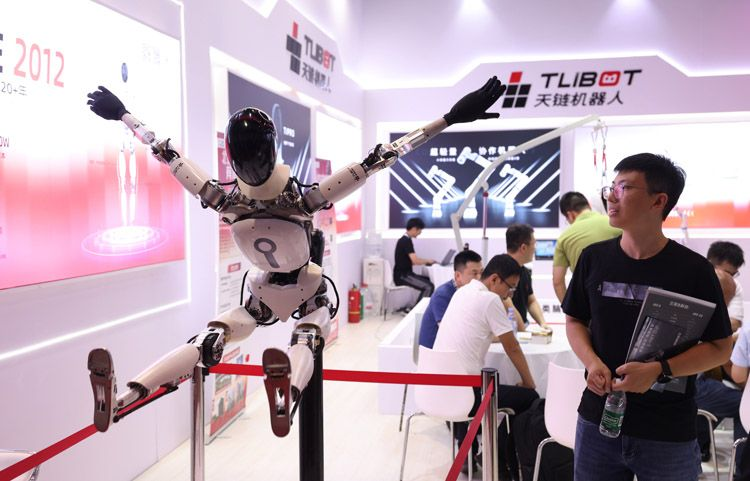
Beijing, China – The global robotics community is abuzz with the announcement that Beijing will host the first-ever World Humanoid Robot Games from August 15th to 17th, 2025. This groundbreaking event, unveiled at a press conference by the Beijing Municipal People's Government Information Office, is set to take place at the prestigious National Stadium, famously known as the "Bird's Nest," and the state-of-the-art National Speed Skating Oval, the "Ice Ribbon." The Games promise to be a spectacular showcase of the latest advancements in humanoid robotics, pushing the boundaries of artificial intelligence, mechanical engineering, and athletic prowess.
Zhang Hua, a Level 2 Inspector from the Beijing Municipal Bureau of Sports, provided a comprehensive overview of the event's structure. The Games will feature a central "main event" complemented by engaging "external events," with anticipation building for preliminary test competitions leading up to the grand showcase in August. The main event is meticulously organized into three distinct categories, encompassing a total of 19 diverse events designed to highlight the versatility, innovative spirit, and practical applications of cutting-edge robot technologies.
The core of the competition lies within the aptly named "competition category," which draws inspiration from traditional human sporting disciplines. This segment features 11 distinct sub-events meticulously crafted to evaluate the physical capabilities and collaborative potential of humanoid robots. Spectators can expect to witness robotic renditions of a track and field heptathlon, comprising the 100-meter dash, 400-meter run, 1500-meter run, 4x100-meter relay, 100-meter hurdles, standing long jump, and standing high jump. Beyond individual athletic feats, the competition will also include floor exercises, demanding precision and balance, and team-based sports such as 2 vs 2, 3 vs 3, and 5 vs 5 soccer matches, emphasizing the robots' coordination and teamwork strategies.
Adding an artistic flair to the Games is the "demonstration category," which includes solo and group dance performances. These events will serve as a platform to exhibit the sophisticated full-body real-time coordinated control systems and the intricate group collaboration capabilities of the robots. Judges will assess the artistic choreography, the synchronization with music, and the innovative nature of the movements, highlighting the seamless integration of hardware and software in these advanced machines.
Recognizing the growing importance of real-world applicability, the "scenario-based challenge category" will immerse humanoid robots in simulated environments mimicking actual working conditions. Six distinct events across three critical sectors – factory, hospital, and hotel – will test the robots' practical skills and intelligent automation capabilities. In the factory setting, robots will be tasked with logistics transportation and efficient organization of materials. Within the hospital environment, the challenges will involve accurate drug sorting and packaging. Finally, in the hotel scenario, robots will be evaluated on their ability to provide effective guidance to guests and perform cleaning services, demonstrating their potential to integrate seamlessly into human-centric workplaces.
To broaden the appeal and showcase the diversity of the robotics field, the Games will also feature "external events" involving non-humanoid robots. These events will include popular sports such as badminton, basketball, and table tennis, with a strong emphasis on engaging performances and direct interaction with the anticipated large audience. This inclusion underscores the multifaceted nature of robotics and provides a platform for showcasing specialized robotic systems alongside their humanoid counterparts.
The First World Humanoid Robot Games in Beijing marks a significant milestone in the evolution of robotics competitions. While various robot competitions have existed for decades, focusing on industrial automation, search and rescue, and other specific tasks, this event specifically centers on humanoid robots performing tasks that often mirror human capabilities. This focus reflects the increasing sophistication of humanoid robots and their potential to interact and work alongside humans in a wide range of environments.
The event is expected to attract leading robotics research institutions, universities, and companies from around the globe, providing a crucial platform for the exchange of knowledge, the showcasing of cutting-edge technologies, and the fostering of innovation in the field. Beyond the competitive aspect, the Games will likely serve as a powerful demonstration of the rapid advancements in AI, sensor technology, actuators, and control systems that are driving the development of increasingly capable and versatile humanoid robots.
The choice of Beijing as the host city underscores China's growing prominence in the global technology and artificial intelligence landscape. China has made significant investments in robotics research and development, and hosting this inaugural world-class event positions Beijing as a key hub for innovation in this rapidly evolving field. The use of iconic venues like the National Stadium and the National Speed Skating Oval further highlights the significance and scale of the event.
The World Humanoid Robot Games are not just a spectacle of technological achievement; they also raise important questions about the future role of humanoid robots in society. As these machines become more adept at performing human-like tasks, discussions around ethics, safety, and the potential impact on various industries will undoubtedly intensify. This event provides a unique opportunity to not only celebrate the advancements in robotics but also to engage in thoughtful conversations about their broader implications.
The anticipation surrounding the Games is palpable, with researchers, engineers, and enthusiasts eager to witness the capabilities of the most advanced humanoid robots in the world. The event promises to be a captivating blend of athleticism, artistry, and practical application, offering a glimpse into the exciting future of human-robot interaction. As August 2025 approaches, Beijing is poised to become the epicenter of the robotics world, hosting an event that could very well define the next chapter in the story of humanoid robots.
[Copyright (c) Global Economic Times. All Rights Reserved.]






























